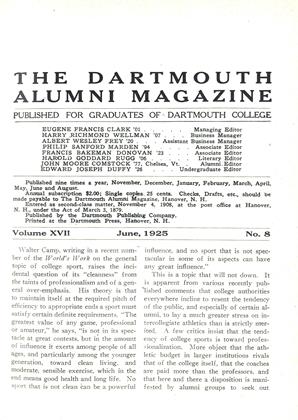Many speaking engagements have kept President Hopkins away from Hanover during much of the last two months. Most significant of the addresses which he has delivered were the lectures in the Academy of Music in Philadelphia where he inaugurated the annual series on the recently established Henry LeBarre Jayne Foundation. The addresses this year were given on April 17, 24 and 30. Dr. Hopkins took as his general subject "Philosophers and Kings."
In the first lecture on "Man and His Fellows" the President, proclaiming himself an optimist, asserted that man's conduct to the present time, has demonstrated his ability to push forward to yet greater heights. After outlining the interdependence of thinkers and doers, he showed how this relationship had been intensified until today all parts of the civilized world depend on each other. This situation has developed an interesting paradox which President Hopkins emphasized, namely "that the same conditions of increased intimacy which drive men into contact with each other physically closer than ever before at the same time isolate them from each other mentally more completely than ever before, through the necessarily complicated organization of society, the higher specialization of effort and the complete mental absorption therein, which it is difficult to avoid." In this connection he said that the realist insisted, in spite of objections by politicians and idealists, that the principles of Washington's time with respect to our contact with nations across the seas were no longer {enable. This lecture closed with a reassertion of man's power to cope with the problems of the future.
The second lecture was entitled "Working Hypotheses and Social Relations." Dr. Hopkins urged calculating the ability of civilization to withstand stresses and strains just as the engineer calculates formulae for use in erecting buildings and bridges. The data needed for calculation of social formulae will be found in history, in economics and in philosophy. He felt that civilization's chief weakness at present was its lack of inclusiveness.. Too many are not conscious of the relations of their lives to that of the group. He predicted that an explanation of these relations on the part of industry would go far toward increasing production and lessening labor dissatisfaction. While in Philadelphia to give this lecture Dr. Hopkins attended a meeting of the Philadelphia Alumni Association on April 23.
In the third lecture on "Problems of Citizenship" President Hopkins warned against increasing government bureaucracy and regretted the lessening significance of the individual voter. The recent war has imposed on this country and its citizens certain obligations for the continued progress of civilization. For this reason our leaders must be carefully selected, men with capacities for both thinking and doing. Much false leadership, possibly productive of ills greater than those which it seeks to combat, is in evidence. Reformers and liberals sometimes attach inordinate importance to mellifluous words and are unwilling to subordinate minor differences of opinion to cooperate for desirable advance.
The preservation of civilization is dependent upon widespread acceptance of principles. Since the method of presentation must be by persuasion, the effort of certain groups to secure support for their beliefs by special pleadings has brought on the great conflict between truth and propaganda. Intolerance, of which the spirit of propaganda is a manifestation, with its unwillingness to profit from the conflict of opinions honestly and courageously held, must be eliminated if our citizenship is to be well founded. Society will progress as the mind of man receives the comingled influence of the thinker and the doer.
The next engagement brought him back to Hanover where he addressed the annual meeting of the Secretaries Association on May 1. Less than a week later he left for a speaking tour among the alumni associations of the West. The Alumni Association of Washington, D. C., had him with them on May 7 and on May 11 he was in Denver addressing the Association of the Great Divide. On May 14 he spoke before the Alumni Association of Southern California in Los Angeles and on the eighteenth of the month addressed the Alumni Association of San Francisco. For his last two addresses on the Pacific coast he journeyed north where he addressed the Portland, Ore., alumni at their meeting May 21 and was in Seattle, Wash., with the alumni there the following day.
 View Full Issue
View Full Issue
More From This Issue
-
 Article
ArticleANNUAL MEETING OF THE SECRETARIES—MAY 1-2, 1925
June 1925 -
 Article
ArticleWalter Camp
June 1925 -
 Article
ArticleDARTMOUTH COLLEGE ENGRAVINGS
June 1925 By Harold Goddard Rugg '06 -
 Article
ArticleFROM THE UNDERGRADUATE CHAIR
June 1925 -
 Article
ArticleNEW CURRICULUM IS ADOPTED; A. B. ONLY DEGREE TO BE GIVEN
June 1925 -
 Class Notes
Class NotesClass of 1917
June 1925 By Ralph Sanborn
Article
-
 Article
ArticleFACULTY PUBLICATIONS
May 1915 -
 Article
ArticleTWO DARTMOUTH MEN REPORTED MISSING
May 1918 -
 Article
ArticleA Good Start
October 1947 -
 Article
Article1963
MAY | JUNE 2016 By —Harry Zlokower -
 Article
ArticleLectures on Fundamental Concepts of Algebra and Geometry.
June, 1912 By A. D. P. -
 Article
ArticleSARAH CONNELL GOES TO THE DARTMOUTH COMMENCEMENT OF 1809
FEBRUARY, 1927 By Dr. James A. Spalding '66


